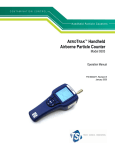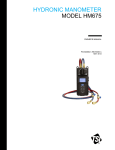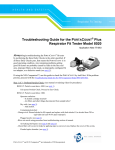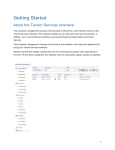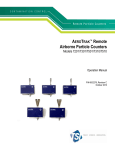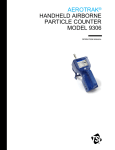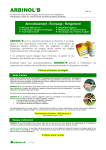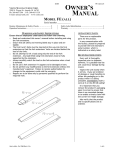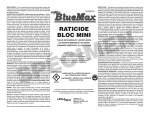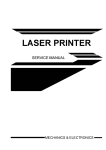Download Qfit Respirator Fit Testers (Manual and Automated
Transcript
Respirator Fit Testing Respirator Fit Testers (Manual and Automatic Versions) User’s Manual P/N 6002712, Revision C December 2010 U.S. and International patents pending. Copyright© TSI Incorporated / 2010 / All rights reserved. Part Number 6002712 / Revision C / November 2010 Address TSI Incorporated / 500 Cardigan Road / Shoreview, MN 55126 / USA Fax No. (651) 490-3824 LIMITATION OF WARRANTY AND LIABILITY (effective July 2000) Seller warrants the goods sold hereunder, under normal use and service as described in the operator's manual, shall be free from defects in workmanship and material for twelve (12) months, or the length of time specified in the operator's manual, from the date of shipment to the customer. This warranty period is inclusive of any statutory warranty. This limited warranty is subject to the following exclusions: a. Hot-wire or hot-film sensors used with research anemometers, and certain other components when indicated in specifications, are warranted for 90 days from the date of shipment. b. Parts repaired or replaced as a result of repair services are warranted to be free from defects in workmanship and material, under normal use, for 90 days from the date of shipment. c. Seller does not provide any warranty on finished goods manufactured by others or on any fuses, batteries or other consumable materials. Only the original manufacturer's warranty applies. d. Unless specifically authorized in a separate writing by Seller, Seller makes no warranty with respect to, and shall have no liability in connection with, goods which are incorporated into other products or equipment, or which are modified by any person other than Seller. The foregoing is IN LIEU OF all other warranties and is subject to the LIMITATIONS stated herein. NO OTHER EXPRESS OR IMPLIED WARRANTY OF FITNESS FOR PARTICULAR PURPOSE OR MERCHANTABILITY IS MADE. TO THE EXTENT PERMITTED BY LAW, THE EXCLUSIVE REMEDY OF THE USER OR BUYER, AND THE LIMIT OF SELLER'S LIABILITY FOR ANY AND ALL LOSSES, INJURIES, OR DAMAGES CONCERNING THE GOODS (INCLUDING CLAIMS BASED ON CONTRACT, NEGLIGENCE, TORT, STRICT LIABILITY OR OTHERWISE) SHALL BE THE RETURN OF GOODS TO SELLER AND THE REFUND OF THE PURCHASE PRICE, OR, AT THE OPTION OF SELLER, THE REPAIR OR REPLACEMENT OF THE GOODS. IN NO EVENT SHALL SELLER BE LIABLE FOR ANY SPECIAL, CONSEQUENTIAL OR INCIDENTAL DAMAGES. SELLER SHALL NOT BE RESPONSIBLE FOR INSTALLATION, DISMANTLING OR REINSTALLATION COSTS OR CHARGES. No Action, regardless of form, may be brought against Seller more than 12 months after a cause of action has accrued. The goods returned under warranty to Seller's factory shall be at Buyer's risk of loss, and will be returned, if at all, at Seller's risk of loss. i Buyer and all users are deemed to have accepted this LIMITATION OF WARRANTY AND LIABILITY, which contains the complete and exclusive limited warranty of Seller. This LIMITATION OF WARRANTY AND LIABILITY may not be amended, modified or its terms waived, except by writing signed by an Officer of Seller. WARNING This instrument contains (1) rechargeable Nickel Metal Hydride (NiMH) battery which is not user serviceable. Disclaimer: ™ The measurement provided by the Qfit Respirator Fit Tester is an assessment of respirator fit during a fit test only. Respirator fit at other times will vary. The fit factor value is not intended for use in calculating an individual's actual exposure to hazardous substances. Service Policy Knowing that inoperative or defective instruments are as detrimental to TSI as they are to our customers, our service policy is designed to give prompt attention to any problems. If any malfunction is discovered, please contact your nearest sales office or representative, or call TSI's Customer Service department at (800) 874-2811 (USA) or (001 651) 490-2811 (International) or visit www.tsi.com. Trademarks TSI, TSI logo, and Qfit are trademarks and registered trademarks of TSI Incorporated. Bitrex is a registered trademark of Macfarlan Smith Ltd. Patents U.S. and International patents pending. ii Contents Introduction ........................................................................................ 1 Handheld Operation.......................................................................... 2 Remote Operation ............................................................................ 4 Reordering Supplies and Replacement Parts .................................. 7 Instructions for Using Qfit™ Respirator Fit Tester in Qualitative Fit Testing (QLFT)—Manual Version ............................ 9 General Test Guidelines ................................................................... 9 Pump Operation .............................................................................. 11 Sensitivity Test ................................................................................ 13 Fit Test ............................................................................................ 15 Halting the Qfit™ Respirator Fit Tester ........................................... 16 Maintenance ................................................................................... 18 Troubleshooting .............................................................................. 18 Comparison of Number of Nebulizer Squeezes ............................. 19 Instructions for Using Qfit™ Respirator Fit Tester in Qualitative Fit Testing (QLFT)—Automatic Version .......................... 21 General Test Guidelines ................................................................. 21 Precautions ..................................................................................... 22 Pump Operation .............................................................................. 22 Sensitivity Test ................................................................................ 25 Fit Test ............................................................................................ 26 Halting the Qfit™ Respirator Fit Tester ........................................... 28 Maintenance ................................................................................... 30 Troubleshooting .............................................................................. 30 Comparison of Number of Nebulizer Squeezes ............................. 31 Qfit™ Respirator Fit Tester Service Procedure ............................. 33 Service and Support ....................................................................... 33 International Contacts ..................................................................... 34 Material Safety Data Sheets ............................................................ 37 Index .................................................................................................. 45 iii (This page intentionally left blank) iv Introduction The Qfit™ Respirator Fit Tester is developed based on OSHA 29CFR 1910.134, Respirator Fit Test Protocol to test the integrity of respirators to a specific individual wearer. The Qfit™ Respirator Fit Tester has two versions: Manual and Automatic. Both versions replace the need to repetitively hand aspirate the rubber squeeze bulb by using an integral pump to disperse the sensitivity and fit test solutions. The main difference between manual and automatic versions is that the manual version requires the users to control Qfit™ fit tester by pressing button manually to execute the fit test protocol, and the automatic version controls Qfit™ fit tester by built-in timing sequence automatically to execute the fit test protocol. Note Users should always follow the OSHA Respirator Standard 29CFR 1910.134, or the authority having jurisdiction to conduct a fit test. The fit test procedures summarized in this manual are the same as those recommended by OSHA except that the solutions are premixed and the generation of the mist is automated from a powered pump rather than generated by repetitively squeezing the nebulizer bulb. 1 Handheld Operation Both the manual and automatic Qfit™ Respirator Fit Testers can be operated under the handheld mode. Figure 1. Handheld Operation To operate in handheld mode: 1. Attach rechargeable battery to Qfit™ fit tester. 2. Attach cartridge with elbow (Figure 2). Figure 2. Attach Cartridge with Elbow 2 Qfit™ Respirator Fit Testers 3. Optional—Attach extension tube to elbow (Figure 3). Figure 3. Attach Extension Tube to Elbow (optional) 4. Plug the cartridge and elbow into the top of the Qfit™ tester (Figure 4). Figure 4. Plug Cartridge and Elbow into the Top of Qfit™ Tester 5. Run the Qfit™ fit tester. Note The Qfit™ battery should be used for handheld operation. Never use the AC power supply during handheld operation. Introduction 3 Remote Operation Both manual and automatic Qfit™ Respirator Fit Testers can be operated under the remote mode. The Qfit™ fit tester Remote Accessory (TSI P/N 805015) is needed in order to run the Qfit™ fit tester under this mode. Figure 5. Remote Operation To operate in remote mode: 1. Remove rechargeable battery from Qfit™ fit tester (remote mode can only be run directly from the AC Adapter). 2. Plug Qfit™ fit tester AC power supply to the Qfit™ fit tester. 4 Qfit™ Respirator Fit Testers 3. Plug Qfit™ fit tester remote connector into the Qfit™ fit tester air outlet (Figure 6). Figure 6. Attach Air Outlet and Cartridge in Remote Operation Introduction 5 4. Plug the cartridge and elbow into the Qfit™ fit tester remote holder. 5. Optional—Attach extension tube to elbow. 6. Run the Qfit™ fit tester (Figure 7). Correct—without Battery Attached Incorrect—with Battery Attached Figure 7. Run Qfit™ Fit Tester in Remote Operation Notes The tubing length is designed specifically for running in the remote mode. Do not cut or change remote tubing length or replace tubing. If you need new tubing, please call TSI customer service. The Qfit™ fit tester battery may never be used for remote mode operation. Always use the AC power supply by itself. 6 Qfit™ Respirator Fit Testers Reordering Supplies and Replacement Parts Qty 8/box 8/box 8/box 8/box 8/box 8/box 1 1 1 1 Introduction Description Bitrex® Sensitivity Test Cartridge Bitrex ® Fit Test Multi-Cartridge Bitrex ® Fit Test Single Cartridge Saccharin Sensitivity Test Cartridge Saccharin Fit Test Multi-Cartridge Saccharin Fit Test Single Cartridge Qfit™ Fit Tester Hood Qfit™ Fit Tester Rechargeable Battery Qfit™ Fit Tester Elbow Assembly Qfit™ Fit Tester External Battery Charger Model/ Part No. 805009 805010 805011 805012 805013 805014 805005 805006 805007 805018 7 (This page intentionally left blank) 8 Qfit™ Respirator Fit Testers Instructions for Using Qfit™ Respirator Fit Tester in Qualitative Fit Testing (QLFT)—Manual Version General Test Guidelines The Qfit™ Respirator Fit Tester procedure is identical to OSHA 29CFR 1910.134 Respirator Fit Test Protocol. The difference is that a single 6-second activation of the QLFT nebulizer is equivalent to 5 squeezes when using the hand aspirated rubber squeeze bulb. Qfit™ fit tester replaces the need to repetitively hand aspirate the rubber squeeze bulb by using an integral pump. The test subjects should not eat, drink, or chew gum for at least 15 minutes prior to testing since that can affect their taste perception. Water, however, is acceptable. During all the sensitivity testing the test subject should breathe with mouth slightly open and tongue extended. Always hold the Qfit™ Respirator Fit Tester upright and level as shown in Figure 8. The battery should be fully charged before beginning testing each day. Correct Incorrect (left/right) Incorrect (forward/backward) Figure 8. Correct and Incorrect Operation Positions 9 Equipment □ □ □ □ □ □ □ Test hood Face mask for the subject (user supplied) One Qfit™ manual nebulizer and elbow Optional extension tube Optional remote nebulizer head (deluxe kits only) One cartridge labeled Saccharin or Bitrex® (Denatonium benzoate) Sensitivity* One cartridge labeled Saccharin or Bitrex® (Denatonium benzoate) Fit** Because of Saccharin’s tendency to crystallize and block the aerosol output, a Saccharin Fit Test cartridge should be used within 2 hours of opening it. Precautions OSHA requires that a medical evaluation of the fit test subject be conducted prior to fit testing. Subjects need to be informed of the fit test ingredients used in the fit test solutions and that they will be exposed to a fine mist during the sensitivity and fit tests. Note Do not refill any sensitivity or fit test solution cartridges. Doing so could result in inaccurate fit test results. ® Bitrex is a registered trademark of Macfarlan Smith Ltd. A Sensitivity Test solution cartridge can be used for multiple test subjects. It can dispense aerosol for 16 sensitivity tests, depending upon the run time required per test subject. ** A Single Use Fit Test solution cartridge can be used for multiple test subjects. It can dispense aerosol for 1 to 3 fit tests, depending upon the run time required per test subject. A Multi-Use Fit Test solution cartridge can be used for multiple test subjects. It can dispense aerosol for 3 to 8 fit tests, depending upon the run time required per test subject. * 10 Qfit™ Respirator Fit Testers Pump Operation The manual version of the Qfit™ Respirator Fit Tester is outfitted with a manual timing control. Charging the Battery Note When you first receive your new Qfit™ fit tester, the battery will need to be fully charged before use. The Qfit™ fit tester battery should be recharged a minimum of 4 hours after 40 minutes (approximately 15 fit tests based on using protocol I) of actual pump runtime. With normal usage, this should be once per day. For high volume users, a second Qfit™ fit tester pump with battery is recommended. When the power in the battery becomes low, the yellow LED flashes to indicate that only a few minutes of battery power remains. You must recharge battery. During the charging operation, the yellow LED will light and automatically turn off after the battery is fully charged. Figure 9. Charging Battery using the Power Supply Manual Version 11 Removing/Replacing the Battery 1. To remove the battery from the Qfit™ fit tester, hold the upper portion of the Qfit™ fit tester, slide the battery (lower portion) sideways to disengage from the assembly (see Figure 10). 2. To replace the battery to the Qfit™ fit tester, while holding the upper portion, slide the battery sideways onto the Qfit™ fit tester. Figure 10. Removing/Replacing Battery For the Sensitivity Test Press and hold down the Qfit™ test button for more than 1 second and then release the button, the pump will dispense the Sensitivity Solution for 6 seconds. The user is required to repeat as necessary to fulfill the timing protocols as shown in Table 1. For the Fit Test Press and hold down the Qfit™ test button for more than 1 second and then release the button, the pump will dispense the Test Solution for 6 seconds. The user is required to repeat as necessary to fulfill the timing protocols as shown in Table 2. 12 Qfit™ Respirator Fit Testers Sensitivity Test 1. The test subject should put on the hood but should NOT wear a mask during this test. 2. Pull the label off the Sensitivity cartridge and snap the elbow onto it. Place this in the Qfit™ Respirator Fit Tester. 3. Insert the nozzle into the hole in the front of the hood. Point it away from the subject’s mouth and nose. 4. Push and hold the Qfit™ fit tester test button for more than 1 second, then release the button. The Qfit™ fit tester will now disperse 6 seconds of solution. Repeat for a total of 12 seconds of Qfit™ fit tester run time. Ask the subject if he/she can detect a sweet (or bitter) taste depending on the sensitivity solution used. If the taste is detected, then the sensitivity test is ended, use Timing Protocol I as shown in Table 1. 5. If a taste was not detected by the first aerosol dispersion, push and hold the Qfit™ fit tester test button for more than 1 second, then release the button. The Qfit™ fit tester will now disperse an additional 6 seconds of solution. Repeat for a total of 12 seconds of Qfit™ fit tester run time. Ask the subject if he/she can detect a sweet (or bitter) taste. If the taste is detected, then the sensitivity test is ended, use Timing Protocol II as shown in Table 1. 6. If a taste was not detected by the second aerosol dispersion, push and hold the Qfit™ fit tester test button for more than 1 second, then release the button. The Qfit™ fit tester will now disperse an additional 6 seconds of solution. Repeat for a total of 12 seconds of Qfit™ fit tester run time. Ask the subject if he/she can detect a sweet (or bitter) taste. If the taste is detected, then the sensitivity test is ended, use Timing Protocol III as shown in Table 1. Manual Version 13 Table 1 Sensitivity Test Timing Protocols of Qfit™ Respirator Fit Tester Timing Timing Protocol I Protocol II Number of 6-second 2 4 activations during sensitivity threshold screening (without respirator) 12 24 Total pump run time (seconds) during sensitivity threshold screening (without respirator) Timing Protocol III 6 36 7. If all three aerosol dispersions did not elicit a sweet (or bitter) taste response, then the sensitivity test is ended. The subject cannot be tested with Saccharin or Bitrex® (Denatonium benzoate) and the other fit solution must be used or another type of qualitative or quantitative fit test must be performed. 14 Qfit™ Respirator Fit Testers Fit Test 1. The test subject should wear a respirator and any other equipment that is normally worn during use of the respirator and that might interfere with the fit, such as glasses or head gear. 2. Pull the label off the Fit Test cartridge and snap the elbow onto it. Place this in the Respirator Fit Tester. 3. Insert the nozzle into the hole in the front of the hood. Point it at the sealing surfaces of the respirator around the subject’s face. fit tester test button for more than 1 4. Push and hold the fit tester will now second, then release the button. The disperse 6 seconds of solution. Repeat as necessary to fulfill the fit test protocols based upon the sensitivity test as shown in Table 2. The fit tester nozzle must be inserted into the hood for all dispersions during the 7 minute test. Table 2 Fit Test Timing Protocols of Respirator Fit Tester Timing Timing Protocol I Protocol II 2 4 Number of 6-second activations during initial Fit Test dispersions (with respirator) 2 Number of 6-second activations of fit 1 test solution for each 30 seconds thereafter (with respirator) Timing Protocol III 6 3 5. The test subject should perform the following exercises during the 7 minute test. If at any point during the test the subject detects a sweet (or bitter) taste depending on the fit test solution used, then the fit test is over. The fit of the mask is not acceptable. However, if all 7 exercises are completed without detecting a sweet (or bitter) taste, then the mask fit passes. Manual Version 15 6. In the case of a failed fit test, the mask can be refitted or a new mask chosen. The test begins again, starting with the Sensitivity test. Halting the Qfit™ Respirator Fit Tester If at any point during the test the subject detects a sweet (or bitter) taste depending on the fit test solution used, then the fit test is over. Fit Test Exercises Note Always follow the OSHA Respirator Standard 29CFR 1910.134, or the authority having jurisdiction. The fit test exercises have been summarized here for convenience. • Minute 1: Breathe normally. Stand in a normal position and do not talk. • Minute 2: Breathe deeply in a normal standing position, do not talk. Be careful not to hyperventilate. • Minute 3: Turn head side to side. Turn head slowly enough to inhale once at the extreme on each side, do not talk. • Minute 4: Move head up and down. Move slowly enough to inhale while looking up at the ceiling, do not talk. • Minute 5: Talk out loud. For example, read the “Rainbow Passage” (Figure 11) below or count backwards from 100. Talk slowly and loud enough to be heard. • Minute 6: Bending over or jog in place. • Minute 7: Breathe normally, stand in a normal position, and do not talk. 16 Qfit™ Respirator Fit Testers Rainbow Passage Figure 11. Rainbow Passage Manual Version 17 Maintenance The top of the Qfit™ fit tester should be inspected for spilled solution. With the cartridge removed, wipe any spilled or dried solution from around the pump air outlet. The elbow should be rinsed out with warm tap water after a change of solution types or at the end of daily use. Because of Saccharin’s tendency to crystallize, store and operate Saccharin Fit cartridges in room temperatures greater than 65ºF. Cartridges are made of polycarbonate and can be recycled. Troubleshooting Problem The pump doesn’t run when the Qfit™ fit tester test button is pushed. The battery is charged, but the battery low indicator is still on. 18 Cause and Solution 1. Make sure rechargeable battery is attached to the Qfit™ fit tester. 2. Check that the battery is fully charged. 3. In order to activate the Qfit™ fit tester, push and hold the button for longer than 1 second and then release the button. 1. Plug the AC adapter in to charge the battery, please note that the yellow LED light will flash three times and stay on to indicate charging. A full battery charging takes about 4 hours. 2. Once the battery is fully charged, the yellow LED light should turn off. Qfit™ Respirator Fit Testers Comparison of Number of Nebulizer Squeezes Comparison of number of nebulizer squeezes per fit test using squeeze bulb and number of activations per Fit Test using Qfit™ fit tester with a sensitivity threshold of 10 squeezes. Number of Nebulizer Squeezes per Fit Test Number of 6 second Activations using Manual Qfit™ Respirator Fit Tester Threshold Test 10 2 Exercise – Normal Breathing 10 2 Interim 30s 5 1 Exercise 2 – Deep Breathing 5 1 Interim 30 s 5 1 Exercise 3 – Turn head side to side 5 1 Interim 30 s 5 1 Exercise 4 – Move head up and down 5 1 Interim 30 s 5 1 Exercise 5 – Talking out loud 5 1 Interim 30 s 5 1 Exercise 6 – Bend over or jog in place 5 1 Interim 30 s 5 1 Exercise 7 – Normal Breathing 5 1 Interim 30 s 5 1 Manual Version 19 (This page intentionally left blank) 20 Qfit™ Respirator Fit Testers Instructions for Using Qfit™ Respirator Fit Tester in Qualitative Fit Testing (QLFT)—Automatic Version General Test Guidelines The Qfit™ Respirator Fit Test procedure is identical to OSHA 29CFR 1910.134 Respirator Fit Test Protocol. The difference is that a single 6-second activation of the QLFT nebulizer is equivalent to 5 squeezes when using the hand aspirated rubber squeeze bulb. Qfit™ fit tester replaces the need to repetitively hand aspirate the rubber squeeze bulb by using an integral pump. The test subjects should not eat, drink, or chew gum for at least 15 minutes prior to testing since that can affect their taste perception. Water, however, is acceptable. During all the sensitivity testing the test subject should breathe with mouth slightly open and tongue extended. Always hold the Qfit™ Respirator Fit Tester upright and level as shown in Figure 12. The battery should be fully charged before beginning testing each day. Correct Incorrect (left/right) Incorrect (forward/backward) Figure 12. Correct and Incorrect Operation Positions 21 Equipment □ □ □ □ □ □ Test hood Face mask for the subject One Qfit™ automated nebulizer and elbow Optional extension tube Optional remote nebulizer head (deluxe kits only) One cartridge labeled Saccharin or Bitrex® (Denatonium benzoate) Sensitivity* One cartridge labeled Saccharin or Bitrex® (Denatonium benzoate) Fit** □ Precautions OSHA requires that a medical evaluation of the fit test subject be conducted prior to fit testing. Subjects need to be informed of the fit test ingredients used in the fit test solution and that they will be exposed to a fine mist during the sensitivity and fit tests. Note Do not refill any sensitivity or fit test solution cartridges. Doing so could result in inaccurate fit test results. Pump Operation The automated version of the Qfit™ Respirator Fit Tester is outfitted with an automated timing protocol. To access the timing protocol, press and hold down the Qfit™ fit tester test button until the yellow LED light turns on (1 second). * ** A Sensitivity Test solution cartridge can be used for multiple test subjects. It can dispense aerosol for 16 sensitivity tests, depending upon the run time required per test subject. A Single Use Fit Test solution cartridge can be used for multiple test subjects. It can dispense aerosol for 1 to 3 fit tests, depending upon the run time required per test subject. A Multi-Use Fit Test solution cartridge can be used for multiple test subjects. It can dispense aerosol for 3 to 8 fit tests, depending upon the run time required per test subject. 22 Qfit™ Respirator Fit Testers Charging the Battery Note When you first receive your new Qfit™ fit tester, the battery will need to be fully charged before use. The Qfit™ fit tester battery should be recharged a minimum of 4 hours after 40 minutes (approximately 15 fit tests based on using protocol I) of actual pump runtime. With normal usage, this should be once per day. For high volume users, a second Qfit™ fit tester pump with battery is recommended. When the power in the battery becomes low, the yellow LED flashes to indicate that only a few minutes of battery power remains. You must recharge battery. During the charging operation, the yellow LED will light and automatically turn off after the battery is fully charged. Figure 13. Charging Battery using the Power Supply Automatic Version 23 Removing/Replacing the Battery 1. To remove the battery from the Qfit™ fit tester, hold the upper portion of the Qfit™ fit tester, slide the battery (lower portion) sideways to disengage from the assembly (see Figure 14). 2. To replace the battery to the Qfit™ fit tester, while holding the upper portion, slide the battery sideways onto the Qfit™ fit tester. Figure 14. Removing/Replacing Battery For the Sensitivity Test Push the button lighting the yellow LED, release the button and wait for the pump to dispense the sensitivity solution for 12 seconds. For the Fit Test Push the button lighting the yellow LED then quickly (within 3 seconds) push the Qfit™ fit tester test button again either 1, 2, or 3 times to activate the timing protocols in Table 5. Note To stop a test protocol at any time, push the Qfit™ fit tester test button once. 24 Qfit™ Respirator Fit Testers Sensitivity Test 1. The test subject should put on the hood but should NOT wear a mask during this test. 2. Pull the label off the Sensitivity cartridge and snap the elbow onto it. Place this in the Qfit™ Respirator Fit Tester. 3. Insert the nozzle into the hole in the front of the hood. Point it away from the subject’s mouth and nose. 4. Push and hold the Qfit™ fit tester test button until the yellow LED light turns on and then release the button. The Qfit™ fit tester will now disperse solution for 12 seconds. Ask the subject if he/she can detect a sweet (or bitter) taste. If the taste is detected, then the sensitivity test is ended, use Timing Protocol I as shown in Table 3. 5. If a taste was not detected by the first aerosol dispersion, push and hold the Qfit™ fit tester test button until the yellow LED light turns on and then release the button. The Qfit™ fit tester will now disperse solution for an additional 12 seconds. Ask the subject if he/she can detect a sweet (or bitter) taste depending on the sensitivity solution used. If the taste is detected, then the sensitivity test is ended, use Timing Protocol II as shown in Table 3. 6. If a taste was not detected by the second aerosol dispersion, push and hold the Qfit™ fit tester test button until the yellow LED light turns on and then release the button. The Qfit™ fit tester will now disperse solution for an additional 12 seconds. Ask the subject if he/she can detect a sweet (or bitter) taste. If the taste is detected, then the sensitivity test is ended, use Timing Protocol III as shown in Table 3. Automatic Version 25 Table 3 Sensitivity Test Timing Protocols of Qfit™ Respirator Fit Tester Timing Protocol I Timing Protocol II Timing Protocol III Number of 12 second activations during sensitivity threshold screening (without respirator) 1 2 3 Total pump run time (seconds) during sensitivity threshold screening (without respirator) 12 24 36 7. If all three aerosol dispersions did not elicit a sweet (or bitter) taste response, then the sensitivity test is ended. The subject cannot be tested with Saccharin or Bitrex® (Denatonium benzoate) and the other fit solution must be used or another type of qualitative or quantitative fit test must be performed. Fit Test 1. The test subject should wear a respirator and any other equipment that is normally worn during use of the respirator and that might interfere with the fit, such as glasses or head gear. 2. Pull the label off the Fit Test cartridge and snap the elbow onto it. Place this in the Qfit™ Respirator Fit Tester. 3. Insert the nozzle into the hole in the front of the hood. Point it at the sealing surfaces of the respirator around the subject’s face. 4. Push and hold the Qfit™ fit tester test button until the yellow LED light turns on. Push the Qfit™ fit tester test button based on the desired Timing Protocol that you noted during the Sensitivity test before 4 seconds have elapsed to initiate one of the three automatic fit test protocols from Table 4. The Qfit™ fit tester will 26 Qfit™ Respirator Fit Testers automatically dispense the amount of aerosol appropriate for QLFT Protocol I, II, or III, based on the Sensitivity test results. During the first minute there will be an initial dispersion of aerosol and then again every 30 seconds there will be a subsequent dispersion. The Qfit™ fit tester nozzle must be inserted into the hood for all dispersions during the 7 minute test. Table 4 Number of Button Pushes for Activations of Qfit™ Respirator Fit Tester Timing Timing Timing Protocol I Protocol II Protocol III 1 2 3 Number of button pushes (press quickly) to activate automatic Fit Test Table 5 Fit Test Timing Protocols of Qfit™ Respirator Fit Tester Timing Timing Protocol I Protocol II Number of 12-second 1 2 activations during initial Fit Test dispersions (with respirator) 1 2 Number of 6-second activations of fit test solution for each 30 seconds thereafter (with respirator) Timing Protocol III 3 3 5. The test subject should perform the following exercises during the 7 minute test. If at any point during the test the subject detects a sweet (or bitter) taste depending on the fit test solution used, then the fit test is over. The fit of the mask is not acceptable. However, if all 7 exercises are completed without detecting a sweet (or bitter) test, then the mask fit passes. 6. In the case of a failed fit test, the mask can be refitted or a new mask chosen. The test begins again, starting with the Sensitivity test. Automatic Version 27 Halting the Qfit™ Respirator Fit Tester If at any point during the test the subject detects a sweet (or bitter) taste depending on the fit test solution used, then the fit test is over. The Qfit™ Respirator Fit Tester timing protocol can be cleared by pushing the test button once. Fit Test Exercises Note Always follow the OSHA Respirator Standard 29CFR 1910.134, or the authority having jurisdiction. The fit test exercises have been summarized here for convenience. • Minute 1: Breathe normally. Stand in a normal position and do not talk. • Minute 2: Breathe deeply in a normal standing position, do not talk. Be careful not to hyperventilate. • Minute 3: Turn head side to side. Turn head slowly enough to inhale once at the extreme on each side, do not talk. • Minute 4: Move head up and down. Move slowly enough to inhale while looking up at the ceiling, do not talk. • Minute 5: Talk out loud. For example, read the “Rainbow Passage” (Figure 15) below or count backwards from 100. Talk slowly and loud enough to be heard. • Minute 6: Bending over or jog in place. • Minute 7: Breathe normally, stand in a normal position, and do not talk. 28 Qfit™ Respirator Fit Testers Rainbow Passage Figure 15. Rainbow Passage Automatic Version 29 Maintenance The top of the Qfit™ fit tester should be inspected for spilled solution. With the cartridge removed, wipe any spilled or dried solution from around the pump air outlet. The elbow should be rinsed out with warm tap water after a change of solution types or at the end of daily use. Because of Saccharin’s tendency to crystallize, store and operate Saccharin Fit cartridges in room temperatures greater than 65ºF. Cartridges are made of polycarbonate and can be recycled. Troubleshooting Problem The pump doesn’t run when the Qfit™ fit tester test button is pushed. The battery is charged, but the battery low indicator is still on. 30 Cause and Solution 1. Make sure rechargeable battery is attached to the Qfit™ fit tester. 2. Check that the battery is fully charged. 3. In order to activate the Qfit™ fit tester, push and hold the button until the yellow LED light turns on and then push the button 1, 2, or 3 times based on sensitivity level. 1. Plug the AC adapter in to charge the battery, please note that the yellow LED light will flash three times and stay on to indicate charging. A full battery charging takes about 4 hours. 2. Once the battery is fully charged, yellow LED light should turn off. Qfit™ Respirator Fit Testers Comparison of Number of Nebulizer Squeezes Comparison of number of nebulizer squeezes per fit test using squeeze bulb and number of activations per fit test using Qfit™ fit tester with a sensitivity threshold of 10 squeezes. Number of Nebulizer Squeezes per Fit Test Number of 6 second Activations using Automatic Qfit™ Respirator Fit Tester Threshold Test 10 2 Exercise – Normal Breathing 10 2 Interim 30s 5 1 Exercise 2 – Deep Breathing 5 1 Interim 30 s 5 1 Exercise 3 – Turn head side to side 5 1 Interim 30 s 5 1 Exercise 4 – Move head up and down 5 1 Interim 30 s 5 1 Exercise 5 – Talking out loud 5 1 Interim 30 s 5 1 Exercise 6 – Bend over or jog in place 5 1 Interim 30 s 5 1 Exercise 7 – Normal Breathing 5 1 Interim 30 s 5 1 Automatic Version 31 (This page intentionally left blank) 32 Qfit™ Respirator Fit Testers Qfit™ Respirator Fit Tester Service Procedure The pump and battery pack for your Qfit™ Respirator Fit Tester are covered by a 1 year manufacturer’s warranty. 1. If your Qfit™ Respirator Fit Tester is not operating properly, contact TSI Customer Service at 1-800-874-2811 (USA) or 01 (651) 490-2811 (Internationally). 2. TSI Customer Service will ask you for the Serial Number of your Qfit™ fit tester found on the bar code sticker on the top of the pump nebulizer. Also, you will be asked for the nature of the operational problem in order to troubleshoot your issue. Service and Support If you have difficulty setting up or operating the Qfit™ Respirator Fit Tester, or if you have technical or application questions, contact TSI Customer Service at: TSI Incorporated 500 Cardigan Road Shoreview, MN 55126 USA Phone: 1-800-874-2811 (USA) or 001 (651) 490-2811 E-mail: [email protected] 33 International Contacts Service TSI Instruments Ltd. Stirling Road Cressex Business Park High Wycombe, Bucks HP12 3RT UNITED KINGDOM Telephone: Fax: E-mail: Web: +44 (0) 149 4 459200 +44 (0) 149 4 459700 [email protected] www.tsiinc.co.uk Technical Support TSI GmbH Neuköllner Strasse 4 52068 Aachen GERMANY Telephone: Fax: E-mail: Web: +49 241-52303-0 +49 241-52303-49 [email protected] www.tsiinc.de TSI Instruments Ltd. Stirling Road Cressex Business Park High Wycombe, Bucks HP12 3RT UNITED KINGDOM Telephone: Fax: E-mail: Web: 34 +44 (0) 149 4 459200 +44 (0) 149 4 459700 [email protected] www.tsiinc.co.uk Qfit™ Respirator Fit Testers TSI France Inc. Europarc Bât. D 26, rue John Maynard keynes Technopôle de Château-Gombert 13013 Marseille FRANCE Telephone: Fax: E-mail: Web: +33 (0)4 91 952 190 +33 (0)4 91 952 191 [email protected] www.tsiinc.fr Qfit™ Respirator Fit Tester Service Procedure 35 (This page intentionally left blank) 36 Qfit™ Respirator Fit Testers Material Safety Data Sheets 37 38 Qfit™ Respirator Fit Testers Qfit™ Respirator Fit Tester Service Procedure 39 40 Qfit™ Respirator Fit Testers Qfit™ Respirator Fit Tester Service Procedure 41 42 Qfit™ Respirator Fit Testers Qfit™ Respirator Fit Tester Service Procedure 43 44 Qfit™ Respirator Fit Testers Index A E air outlet and cartridge, 5 automated, 21 automated timing protocol, 22 elbow assembly, 7 equipment automated, 22 manual, 10 extension tube automated, 22 manual, 10 extension tube to elbow, 3 external battery charger, 7 B battery charging, 11, 23 charging using power supply, 11, 23 low, 11, 23 removing, 12, 24 removing/replacing, 12, 21, 24 bending over, 16 Bitrex®, 10, 14, 22, 26 fit test multi-cartridge, 7 fit test single cartridge, 7 sensitivity test cartridge, 7 bulb. (see hand aspirated rubber squeeze bulb C cartridge automated, 22 manual, 10 cartridge and elbow, 3 cartridge with elbow, 2 charging battery, 11, 23 charging battery using power supply, 11, 23 D denatonium benzoate, 10, 22 disclaimer, ii F face mask automated, 22 manual, 10 fit test automated, 26 manual, 15 timing protocols, 15 fit test timing protocols automated, 27 fit tester hood, 7 fit tester nozzle, 15, 27 G general test guidelines automated, 21 manual, 9 H halting automated, 28 manual, 16 hand aspirated rubber squeeze bulb automated, 21 manual, 9 45 handheld operation, 2 O I operation handheld, 2 remote, 4 OSHA automated, 22 manual, 10 OSHA 29CFR 1910.134 respirator fit test protocol, 1, 16, 28 international contacts, 34 introduction, 1 J–K jog in place, 16 L label automated, 13 manual, 15 M maintenance automated, 30 manual, 18 manual, 9 manual timing control, 11 material safety data sheet, 37 Bitrex solutions, 37 saccharin solutions, 41 N nebulizer and elbow automated, 22 manual, 10 nebulizer squeezes automated, 31 manual, 19 nickel metal hydride, NiMH battery warning, ii number of button pushes for activations, 27 46 P precautions automated, 22 manual, 10 pump operation automated, 22 fit test automated, 24 manual, 12 manual, 11 sensitivity test manual, 12 Q QLFT, 9 qualitative fit testing automated, 21 manual, 9 R rainbow passage, 17, 29 automated, 29 manual, 17 rechargeable battery, 7 remote nebulizer head automated, 22 manual, 10 remote operation, 4 air outlet and cartridge, 5 correct and incorrect, 6 Index removing battery, 12, 24 removing/replacing battery, 12, 21, 24 reordering replacement parts, 7 supplies, 7 replacement parts reordering, 7 U–V S warranty, i water, 9, 21 saccharin automated, 30 fit test multi-cartridge, 7 fit test single cartridge, 7 manual, 10, 18 sensitivity test cartridge, 7 sensitivity test automated, 25 test timing protocols, 26 manual, 12, 13 test timing protocols, 14 service, 33 international contacts, 34 service policy, ii service procedure, 33 supplies reordering, 7 support, 33 usage battery automated, 23 manual, 11 W–X Y–Z yellow LED, 11, 22, 23, 25, 26 T technical contacts, 33 technical support international, 34 test exercises automated, 28 manual, 16 test hood and collar automated, 22 manual, 10 troubleshooting automated, 30 manual, 18 Index 47 TSI Incorporated – 500 Cardigan Road, Shoreview, MN 55126 U.S.A USA Tel: +1 800 874 2811 E-mail: [email protected] Website: www.tsi.com UK Tel: +44 149 4 459200 E-mail: [email protected] Website: www.tsiinc.co.uk France Tel: +33 491 11 87 64 E-mail: [email protected] Website: www.tsiinc.fr Germany Tel: +49 241 523030 E-mail: [email protected] Website: www.tsiinc.de India Tel: +91 80 41132470 E-mail: [email protected] China Tel: +86 10 8251 6588 E-mail: [email protected] Singapore Tel: +65 6595 6388 E-mail: [email protected] Contact your local TSI Distributor or visit our website www.tsi.com for more detailed specifications. P/N 6002712 Rev. C (12/16/2010) Copyright © 2010 by TSI Incorporated Printed in U.S.A

























































